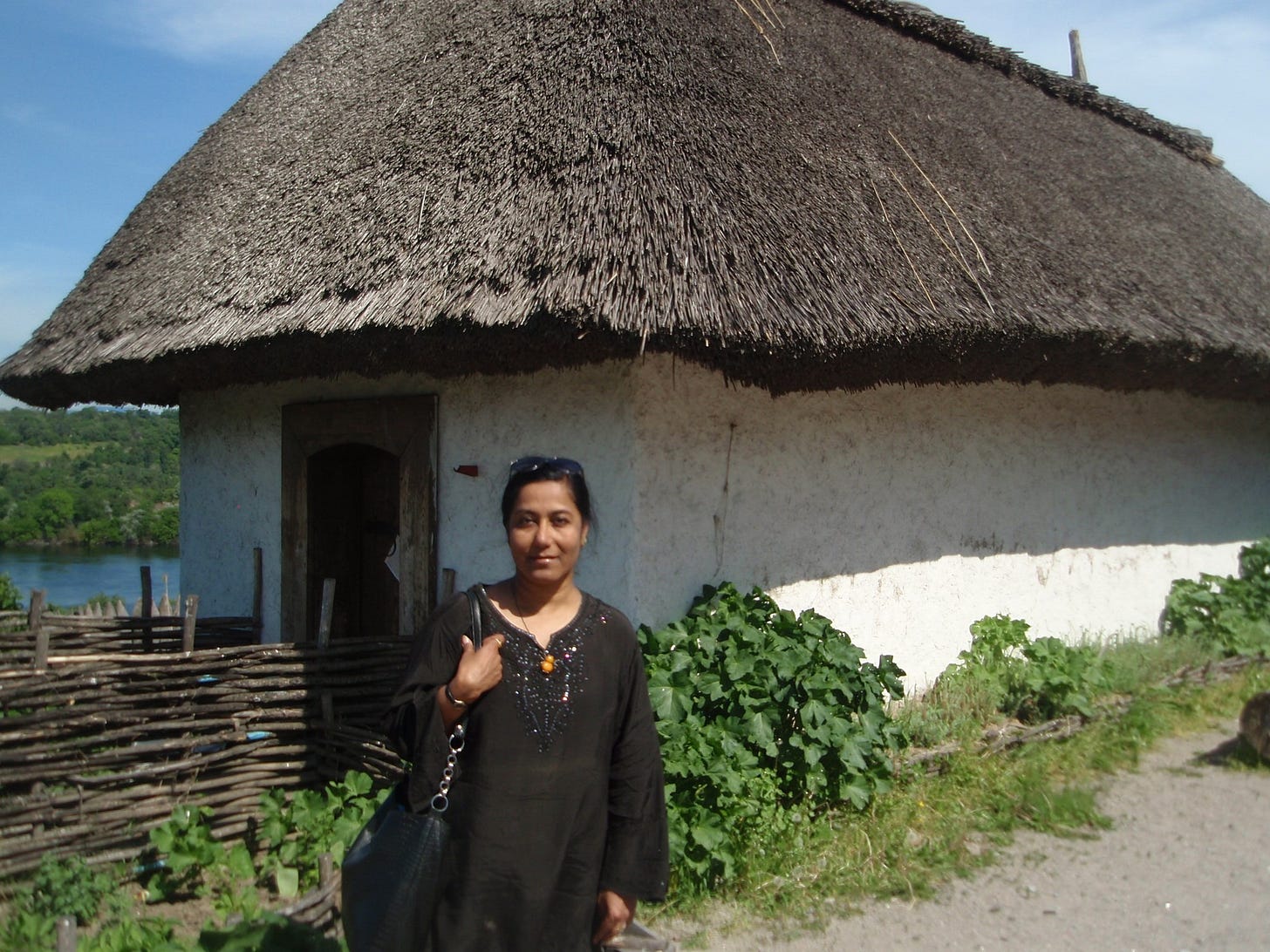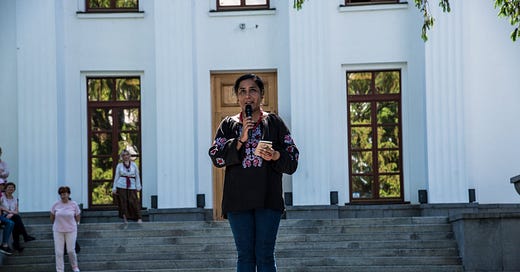An earlier post had been about Indian diaspora and other expats in Ukraine.
One extraordinary person among this half million expats in and around Kyiv and the 1.4+ billion Indians in India and also the 35 million in the Indian diaspora, all put together, is Dr. Mridula Ghosh, International Relations expert, writer, academic. Hence the title of this article.1
Dr. Ghosh not only blazed her own trail, but also studied the changing scenes around her long before others took note.
Mridula was doing her Ph.D. in International Relations in Kyiv when I met her. Our paths did not cross much then as I was studying veterinary medicine and belonged to a later cohort of Indian students in Kyiv than she. A couple of decades later, I connected with her on Facebook and only vaguely paid attention to her updates about the 2014 Maidan Revolution or the Revolution of Dignity. I say vaguely, because it was a critical time for me professionally and personally and I had only so much band-width for the goings-on in the outside world. I was overwhelmed in a new career position that required travel and my children were still young.
Yet, when the final weeks of 2021 came around with news of Russian troops at the border of Ukraine, I turned to Mridula for answers about questions that lingered on the back-burner of my mind since 2014.
Why were there more news reports about Ukrainian corruption, but not Russian corruption, in the U.S. during Trump’s administration from 2017 to 2020? Why the double standards by Trump, by American media, by Russians? Why does a woman from Donetsk on Facebook, writing in Russian in 2021, credit Russia with “looking after” its people economically while denouncing Ukraine? Most importantly, how much of this has to do with Russia being relatively ahead of the game than Ukraine due to its position similar to Britain relative to India?
That last question was my very first articulation of my fledgling thoughts that something akin to a colonial power and its colony existed between Russia and Ukraine. After all these years, it had finally dawned on me that the framework of colonizer and colonized applies to Russia and Ukraine as well. And the only person I could instinctively think of who could help me understand more, fill gaps in my knowledge of Ukrainian people’s history would be Mridula. And sure enough, Mridula opened a whole new world of discourse regarding Russian imperialism, Russian colonialism and Russian post-colonial studies and narratives.
A discovery I made about Mridula, after all these years (once again, that sheepish phrase of mine), was her early recognition (in 1990-91) that not knowing Ukrainian hindered foreigners and foreign students in Ukraine from really getting to know Ukraine — its culture, people, history — and its aspirations for the future. Sure, we lived on Ukrainian soil (and some like me actually went into rural areas as a veterinary student and interacted with milkmaids and farmhands and feldshers and livestock owners who spoke in Ukrainian even when spoken to in Russian), but did we really see them?
In the Soviet system, foreign students were placed in different cities in most Soviet republics that spanned current day Russia, Ukraine, Georgia, Armenia, Belarus, Moldova, Estonia, Kazakhstan, Uzbekistan… But the language we were taught was Russian, in a very centrally-coordinated, preparatory-course curriculum. As students, we accepted that since the medium of instruction of our chosen majors would be in Russian, this preparatory course was very practical, necessary and useful. Plus, Russian was a major language recognized in the world. We were gaining a language! At the end of our studies, in addition to the degree we earned in our chosen field of studies, we also received a certificate to teach Russian as a foreign language — as a bonus — after completing a short series of electives (even though none of us had training in pedagogy).
However, what we didn’t realize as students was that it kept us immersed in a very Russocentric culture and taught us to see local and Indigenous peoples only through the Russian lens. More accurately, our Russian immersion led us to NOT see the people for who they were — their values and contributions, their pasts and their silences, the subsuming of their cultures and languages, at best, and at worst, the erasure of their identities. More about that another day. Today I only want to impress upon the world that Mridula woke up to this realization very, very early compared with some of us. There are still many international graduates among our cohorts who unabashedly long for their “Russian pasts” and uncritically and interchangeably articulate their longing as nostalgia for Soviet days (and vice versa), clueless about how jarring and out of place it sounds now. Thankfully, they do not live in Ukraine. Or maybe it is precisely because they do not live in Ukraine that they are still living in the past. Mridula’s academic interests in history, languages and political economy gave her an insight that those of us studying engineering and medicine and agriculture lacked.
Mridula’s realization that to live on the land of Ukrainians without learning Ukrainian is a travesty led her to request that Ukrainian language-learning be part of her Ph.D. curriculum. From what I understand now, that did not happen easily due to a combination of bureaucratic, political, educational programmatic reasons of that time. And so, Mridula began to learn Ukrainian on her own and with the help of her friends, tutors and iron-willed determination. She gave herself the gift of appreciating Ukrainian poetry and literature in the original, and not in translation, so much so that she translated a book of Ukrainian poetry into Bengali. Yet another one of the many feathers in her hat.
Mridula is the author of the first ever translation of Ukrainian literature into Bengali. The year 2011 saw the publication of her anthology ‘Ukraine Alpona – Ukrainskyi Vizerunok’, containing works of 28 Ukrainian poets from ancient till modern times. In 2012, she published a translation of Lesya Ukrainka’s drama ‘Lisova Pisnya’ (Forest Song).
Many Indians decry the impact of British colonialism and imperialism on India, but fail to (or refuse to) see Russian colonialism and imperialism subjugating Ukraine. Few think about how Russia’s hold on Ukraine has hindered Ukraine’s growth after independence. Many intellectuals in India oppose American imperialism, but other than Mridula, I know of no Indian academic or intellectual who studies independent and post-Soviet Ukraine. Even Arundhati Roy, that firebrand globally known for her criticism of American imperialism, goes quiet when it comes to Russia — like many on the American left, like many on the Indian left. Quite a few Indians, mainly Tamils, who saw Hindi language imposition as a troubling phenomenon in India, are blind to the parallels in the lands of the former Soviet Union, including Ukraine, when it comes to Russian language domination.
It is always exciting to be the first in any field of study. Sometimes, though, being first can feel lonely. But not for someone with Mridula’s will and people skills. Even so, there is this phenomenon in academia and in the world of writing that those who think for themselves and carve their own paths, sometimes, don’t get the necessary recognition early enough, even among people who share similar interests. Intellectual work thrives on a critical mass of like-minded thinkers who become part of the support system — the “schools of thought” that can bolster someone’s work and help them become a household name; the physical infrastructure and "centers” that attract and connect networks of people who gravitate towards each other and improve the overall productivity. It is easy to forget the strength it required of someone to forge their own path and stand tall on their own in the last two decades. Today, anyone can, with a little bit of work and lots and lots of technology, become a force — a podcaster or a freelance writer — relatively easily.
And that is a big reason why I was very happy to read this on The Print:
Mridula Ghosh: Associate Professor, National University of Kyiv-Mohyla Academy Mridula is perhaps the only Indian intellectual who can speak both Russian and Ukrainian, in addition to English, and has published in all three languages with equal proficiency. She has done extensive work on post-colonialism, particularly on the de-colonisation of Ukraine from an Indian post-colonial perspective. Having worked with the UN on gender and developmental issues and conducted significant ground research, Mridula embodies the spirit of the modern Indian woman intellectual who dons several hats with equal elan.
— Who are India’s strategic affairs thinkers of the next decade?
The Print Intellectuals List, 4 December, 2024.
A panel of jurors Ram Madhav, Rudra Chaudhuri, TCA Raghavan, Swasti Rao, and C Raja Mohan separately nominated a list of geostrategic thinkers as part of The Print's list of India's next-generation intellectuals.
Among other accomplishments, Mridula is a regular contributor to The Week, an Indian publication. She initiated and manages the project ‘Ukraine and South Asia: Open Dialogues” at the Eastern European Development Institute at Ukraine (EEDI-Ukraine). The YouTube channel for the EEDI-Ukraine Open Dialogues project can be found here.
A sample of Mridula Ghosh’s writings:
Google scholar. (Academic)
Nezlamnist — The Face of Ukrainian Resistance
About Indian Prime Minister Narendra Modi’s visit to Kyiv, Ukraine, earlier this year.
Why Ukrainians will not accept any truce.
Linked below is an EEDI-Ukraine Open Dialogues video discussion about international students currently living in Ukraine. I have a story to share about it.
On Sunday, 17 November, 2024, I was staying up late to make sure that I attend this Zoom meeting on EST from the U.S. In Kyiv, however, it turned out to be a night of chaos. Russia launched a massive air attack on cities across Ukraine, the biggest aerial attack since August, killing at least six people. According to President Zelenskiy, about 120 missiles and 90 drones were fired through the night and early morning, the strikes targeting Ukraine’s energy grid in an effort to disrupt power supply. I received texts and a photograph from Mridula describing some of this as she waited out the sirens from an underground shelter. Worried and tensed for her and for Ukraine, I wondered if the scheduled Zoom meeting would be carried out as planned. Possibly believing that it would not happen, I fell asleep at some point. But I was wrong. It did happen as scheduled! By my calculations, it was under 2 hours between the last of the air strikes and the panel discussion carried out on Zoom. This YouTube video is a testament to Mridula’s tenacity (and also the international students’ grit). You’ve got to tip your hat to them for it.
Having highlighted fundraising efforts through ‘Ukraine Matters’, I asked Mridula if she would suggest any one of the organizations close to her heart. She responded with ‘Come Back Alive’ or ‘Povernis zhyvym.’

It is not an exaggeration — we don’t realize how many people among us are truly one of a kind by how they choose to live their lives, what trails they blaze, how they spend their precious time on earth relative to their peers. We are constantly bombarded with news and stories about the more flashy ones in the public’s eye who demand and get attention or the more conventionally-recognized accomplishers in our midst.





Thank you @Martin Kuz 🙏🏽
The other phenomenon that seems to apply is that the work of a groundbreaking intellectual, often ignored or maligned by her peers, often becomes self-evident in retrospect.
It is so obvious now that Ukraine (and Georgia, etc.) is a colonial narrative. Bravo to her.